Grounds for That
I’m talking coffee grounds this week. It all started when I happen to see a post on Facebook from my local coffee shop 3J's Coffee . They were advertising they had free coffee grounds for your compost pile. I thought to myself “It’s good they sent the right message and said need compost not fertilizer?”
https://www.facebook.com/3jscoffee/posts/1872362372776188
I happen to stop in later in the week and saw the owner. I mentioned that I appreciated the fact that they said for your compost pile. She said thank you and from there this week’s topic was decided.
It’s not something the large-scale grower considers. I realize this. I was even thinking about ditching the topic altogether. After last week’s half-assed attempt to instill wisdom about the use of vinegar, I was convinced I needed to step up my game and talk about more serious-minded agronomic topics like how to grow 200 bushels of corn per acre.
Then I decided, screw it. Some well-meaning other person has that covered. I’m talking about coffee grounds. And here’s why
1. A considerable percentage of growers I work with started as hobby or backyard growers.
2. The industry lacks for current if any research regarding anecdotal information about inputs used by naturally-based or certified organic growers.
As I mentioned, a considerable percentage of growers I work with started as hobby or backyard growers. They bring with them all the googled, passed down, well-meaning information gardeners’ like to share. Then they become a CSA/market grower doing it on a larger scale with that same backyard information mindset. Not that there isn’t value to that. I’m not putting anyone or anything down. But to scale up, you have to think up and ditch the backyard mindset. Don’t lose the zeal and excitement for growing great produce or vegetables but take your thinking aka management to an elevated level on par with the scale it takes to supply a CSA or market.
One of the nuggets of great info out there is the practice of using coffee grounds as fertilizer. I understand the positive environmental impact it can have to keep them out of landfills. I also realize that there is very little if any real data to support the fertility claims that are made. I often hear things like, “I use it for my rose bushes with a banana peel, and they grow bigger and bigger every year. I have the best roses in town!” For the backyard grower that might be sufficient evidence, however, for a production level grower, it is not scientifically based research adequate to be of benefit to a CSA/market scale system.
In an abstract from Urban Forestry & Urban Greening Vol. 18 August 2016 pg. 1-8, it suggests not to use coffee grounds in a horticultural production setting due to stunted growth and inconclusive data.
https://www.sciencedirect.com/science/article/pii/S1618866716300103?via%3Dihub
However, in a study conducted in South America, there was evidence that the addition of coffee grounds in Arenosols soils was beneficial.
https://onlinelibrary.wiley.com/doi/full/10.1111/j.1475-2743.2010.00315.x
Note that each study was conducted in entirely different settings and different soil types. It’s not comparing an apple to an apple, and that needs to be taken into consideration. There is not enough research out there for me to feel comfortable recommending a grower use it in their fertility program. And what I could find on actual numbers is variable. To get accurate levels of the nutrients and pH, you would need to take a representative sample from each batch of grounds you collected. That almost defeats the purpose of it being an economical addition to a fertility program.
However, I do feel that with what information is currently available coffee grounds could be an excellent addition to composting. Research has been done that suggests coffee grounds could help maintain temperature levels that will kill pathogens. Whether that is entirely accurate or not, due to the fact the research is still somewhat lacking, it still can’t be a bad addition in appropriate amounts.
https://phys.org/news/2008-07-coffee-grounds-perk-compost-pile.html
My stash of coffee grounds headed for the compost pile
My advice
If you are a gardener doing some composting, use the coffee grounds as an addition to your compost pile. If you want to amend specific areas of your garden directly, apply an appropriate amount and work it into the soil.
If you are a market/CSA grower use them in any composting, you are doing but not directly incorporated in any production areas like greenhouses or raised beds. You should now be at a level you are monitoring and adjusting the fertility of those systems with specific inputs, and due to the variability of coffee grounds, there is the potential for things to get out of balance. If you have a source that can supply them in a large enough quantity while not inundating you with them, get the grounds tested for nutrient content and pH. That way you have an idea what you are working with and can make a more sound decision as to how and where you could potentially work them into a fertility plan.
Go to your local coffee shop buy a cup of coffee take some time to get to know the owner and staff and while you’re there get a bucket of coffee grounds for your compost pile.
Just as they have the potential to be good for your compost, it might be an excellent way to build a relationship that could potentially turn into a customer for you, and there is always grounds for that.
Again, thank you 3 J’s Coffee Shop in Palmyra, Pennsylvania. You made this agronomist’s day by sending the right message and making a great cup of coffee.


